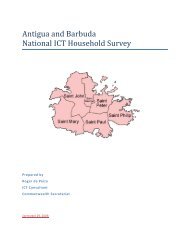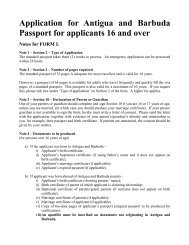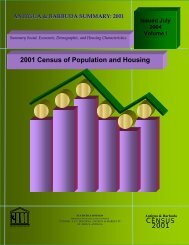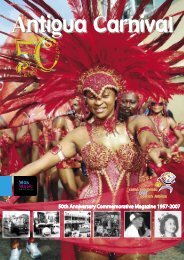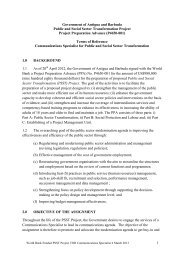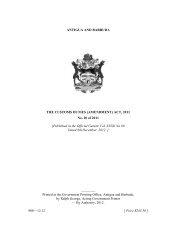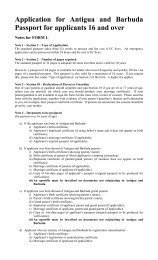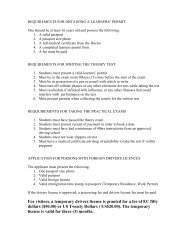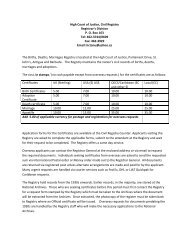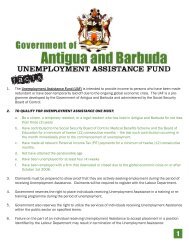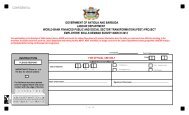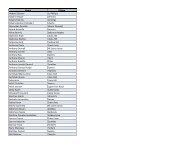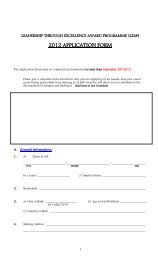BARBUDA'S FIRST CARIBANA - Antigua & Barbuda
BARBUDA'S FIRST CARIBANA - Antigua & Barbuda
BARBUDA'S FIRST CARIBANA - Antigua & Barbuda
You also want an ePaper? Increase the reach of your titles
YUMPU automatically turns print PDFs into web optimized ePapers that Google loves.
Calypso<br />
profile<br />
Shelly Tobitt<br />
Calypso Writer Extraordinaire<br />
Shelly Tobitt, one of <strong>Antigua</strong> and<br />
<strong>Barbuda</strong>’s most celebrated Calypso<br />
writers, who has written extensively<br />
for Sir McLean “King Short Shirt”<br />
Emanuel, as well as other artistes<br />
from <strong>Antigua</strong> and <strong>Barbuda</strong> and the<br />
wider Caribbean, was contacted for<br />
the following interview.<br />
Question: When did you first<br />
become involved in Calypso in<br />
<strong>Antigua</strong>?<br />
Answer: I started writing at<br />
about age 6. In August of 1955,<br />
Emancipation Day, my older brother<br />
Roosvelt Tobitt, better known then<br />
as Lord Black Shirt, sang in the<br />
calypso competition organized by a<br />
local printer by the name of Foster.<br />
This competition was held at the<br />
local labor union hall in Point, at<br />
lower St. John's Street. Below the<br />
union hall was a rum shop and<br />
the singers sang from a window<br />
overlooking the south entrance<br />
where there was a deep gutter<br />
separating the road. My brother<br />
worked as a printer for Foster and<br />
he encouraged him to sing in the<br />
show, and my brother took me<br />
along with him. My brother went on<br />
to win the competition, received a<br />
couple shillings and a bottle of rum<br />
as his prize, and a cardboard crown<br />
painted with gold paint. I was so<br />
excited by it all that night.<br />
My brother had a beautiful singing<br />
voice and wore a long black gown<br />
when he “sang around”, a term<br />
used then by calypso singers, as<br />
they went from corner to corner<br />
singing extempore. My brother was<br />
well known then, and though I was<br />
always afraid of him in his long<br />
black gown, I loved to hear him sing<br />
and would follow him around. I can<br />
remember him singing in the cotton<br />
fields, while we all picked cotton<br />
back then and on the tractors in the<br />
sugar cane fields,<br />
as we packed them with the canes<br />
to be transported to the locomotives<br />
that would take them to the factory<br />
to grind. We sang a lot of Benna<br />
extempore back then and I quickly<br />
learned the art of composing<br />
calypsos.<br />
Question: For how many years did<br />
you write?<br />
Answer: I still write on occasions,<br />
so I guess the jury is still out on<br />
that. However, there was a period<br />
from 1970 to 1989 when I wrote at<br />
least 50 songs a year.<br />
Question: Who did you write for?<br />
Answer: I wrote for almost<br />
everybody who was anybody in<br />
music then, and not just in <strong>Antigua</strong>.<br />
If I were to begin listing names I<br />
would be listing into next week. In<br />
a real sense, as a songwriter I was<br />
really competing against myself. It’s<br />
easier to list the names of <strong>Antigua</strong>n<br />
singers I never wrote for than it is<br />
to include all I did write for. There<br />
were many years when my songs<br />
were 124567 or 134567 in the<br />
calypso competitions. There were<br />
also many years where I produced<br />
multiple record albums. Later when<br />
I began totally arranging my own<br />
compositions, I was constantly<br />
writing music. I have written for<br />
singers from <strong>Antigua</strong>, St. Kitts,<br />
St.Thomas, Barbados, Guyana,<br />
Jamaica, and Trinidad.<br />
Question: How many winning<br />
compositions did you write?<br />
Answer: I cannot count them<br />
because I don’t keep track of them.<br />
Although I wanted my songs to win<br />
in the competitions, it was not to<br />
win that I wrote. I wrote to make a<br />
difference. To effect change – not<br />
just in the art form, but changes in<br />
the life of the people who valued<br />
my work. Change in their relative<br />
understandings, their way of living<br />
and thinking, in their festive conduct<br />
and culture. To win was nice, but to<br />
evolve and progress in a real sense<br />
was the goal.<br />
Question: What is your favorite<br />
song? Why?<br />
Answer: My favorite song is not<br />
among the generally accepted<br />
better songs that I have written,<br />
but it’s a song I like a lot because<br />
it speaks to me. It’s a song I wrote<br />
to myself, for myself, but shared<br />
with everyone through a recording<br />
of it. It’s called “Time’s running out<br />
– what you gonna do?”, but the<br />
name was shorten to something<br />
else – I don’t even remember what<br />
that was. It was a time in my life<br />
when I was faced with choices<br />
I had to make. They were hard<br />
choices I’d rather not make but<br />
knew I had to. There were regrets<br />
and sadness, anger, complacencies<br />
– total paradox. But, I wrote it and<br />
I listened to it over and over again,<br />
then I walked away, not forever,<br />
but I walked away. A few years<br />
later, I really, truly walked away. I<br />
know this paragraph is cryptic, but<br />
the people who would show any<br />
interest in reading this understand.<br />
Question: How does it make<br />
you feel that so many of your<br />
calypsos, particularly the social<br />
commentaries, are still so alive &<br />
fresh and have become classics?<br />
continued on p68<br />
come celebrate<br />
our<br />
golden jubilee



